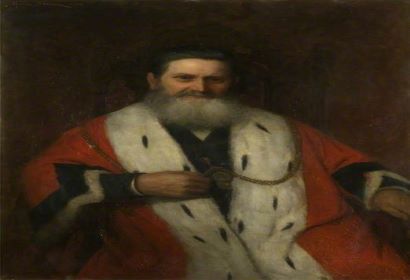Record details
| Title | Joseph Gurney 1814 - 1893 |
|---|---|
| Image |

|
| Description | A local councillor and Mayor, Gurney founded the Northampton Freehold Land Society, enabling working men to own their homes. This was a predecessor of the Nationwide Building Society. Gurney was a leading radical who championed parliamentary reforms and was Charles Bradlaugh's foremost supporter. He lived at Elysium Cottage, which is demolished, but was close to the bottom of Freehold Street. |
| Location | Gurney's plaque is located on the side of 1 -2 Elysium Terrace, on the corner of Freehold Street. NN2 6EN. |
| Summary |
Joseph Gurney first came to attention by his opposition to the Vicar’s Rate, payable to the local Anglican parish priest. Non- conformist Christians, and also secularists like himself, resented being taxed by a church they did not attend. He was twice tried in court on charges arising from his resistance, and was acquitted both times. Later, he served as a local councillor, Mayor, Magistrate, School Board member, and Improvement Commissioner. The Northampton Freehold Land and Building Society (a predecessor of the Nationwide) was founded in his Gold Street shop in 1848. Gurney was a Director from the beginning, Secretary from 1856, and President from 1891. He was the driving force in this enterprise, which was often known as “Gurney’s Society.” It helped working men to own their own homes, and, with the franchise contingent on property ownership, enabled them to vote. Gurney was a leading political Radical during Northampton’s most radical period. A pioneer democrat, he supported the Reform Acts of 1832, 1867 and 1884, which gradually extended the right to vote, and the Ballot Act of 1872. According to Edward Royle, Gurney’s name “runs like a silver thread through the history of Bradlaugh radicalism in Northampton.” His obituary in the Mercury recorded: “For half a century he held a foremost place in the municipal and parliamentary history of Northampton, always one of the leaders of the advanced guard . . . in the forefront of every progressive movement . . . active in every endeavour to extend the principle of human justice.” Gurney stood, unsuccessfully, for election to the Town Council as a Chartist, then as a Radical, before finally being elected in partnership with the Liberals. In 1859 and again in 1868, he invited the secularist lecturer, Charles Bradlaugh, to speak in Northampton, beginning Bradlaugh’s long association with both Northampton and Gurney. Gurney and Thomas Adams sponsored Bradlaugh’s unsuccessful Northampton parliamentary campaigns in 1868 and 1874, and formed the alliance of Radicals and Liberals which at last secured his election in 1880. Gurney’s strong support continued during the bye -elections that followed the Speaker’s refusal to allow Bradlaugh to swear the oath and take his seat, and a through a second general election. In the meantime, Gurney became an a lderman in 1874, and Mayor in 1875 and 1879. He was never afraid to go against public opinion. In 1878, when Bradlaugh faced hostile criticism for co-publishing a controversial pamphlet on birth control, Gurney chaired a Town Hall meeting in his defence. As his friend, J. M. Robertson, said at his funeral: “He was one of those who instead of waiting to choose a cause when it should seem to be respectable, chose his cause first of all, with the most disinterested regard to truth and justice.” At his request there were no wreaths or flowers at his funeral, which consisted simply of Robertson’s short graveside eulogy. |
